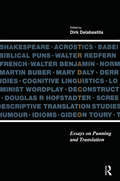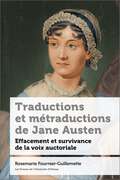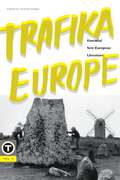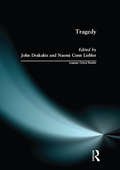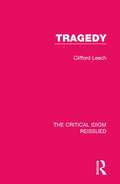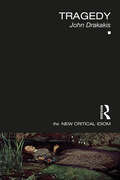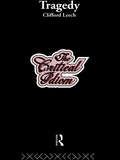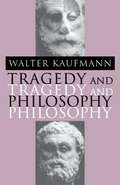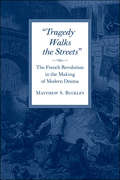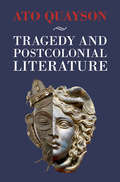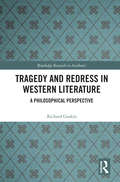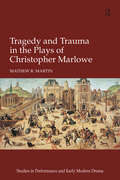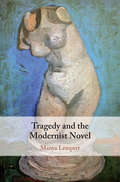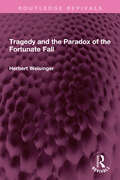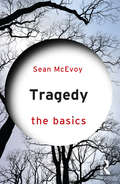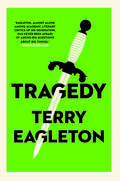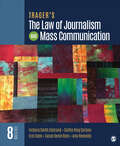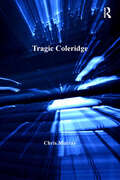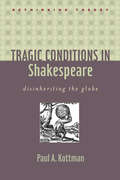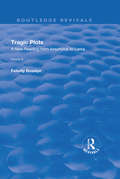- Table View
- List View
Traductio: Essays on Punning and Translation
by Dirk DelabastitaNothing like wordplay can make difference between languages look so uncompromising, can give such a sharp edge to the dilemma between forms and effects, can so blur the line between translation and adaptation, or can cast such harsh light on our illusion of complete semantic stability. In the pun the whole language system may resonate, and so may literary traditions and ideological discourses. It follows that the pun does not only put translators to the test, it also poses a challenge to the views and concepts of those who study translation. This book brings together experts on translation and the pun, as well as researchers representing a variety of other relevant disciplines and schools of thought, ranging from theology to deconstruction and from contrastive linguistics to feminism. It can be read as a companion volume to Wordplay and Translation, a special issue of The Translator (Volume 2, Number 2, 1996), also edited by Dirk Delabastita
Traductions et métraductions de Jane Austen: Effacement et survivance de la voix auctoriale (Regards sur la traduction)
by Rosemarie Fournier-GuillemetteLa réputation de l’autrice britannique Jane Austen, particulièrement dans le monde anglophone, n’est plus à faire : son œuvre est abondamment fréquentée par les lecteurs et lectrices, et l’on ne compte plus les adaptations et continuations – textuelles et transmédiatiques – de ses romans. En français seulement, ses ouvrages ont été l’objet de plus de 70 traductions en deux siècles d’existence.Comment son écriture, où abondent humour, ironie et discours indirect libre, a-t-elle été intégrée au corpus français ? Alors qu’Austen fait déjà l’objet de débats dans le monde anglo-saxon, quelle interprétation aura franchi la Manche et été proposée au lectorat francophone ? Ce transfert linguistique aura-t-il, pour l’autrice, donné lieu à une traduction ou à une métraduction ?Analyse littéraire combinant les disciplines de la traductologie, la narratologie et des études féministes, ce livre se penche, avec une approche diachronique, sur les traductions françaises de trois romans de Jane Austen : Northanger Abbey (1803 [†1818]), Pride and Prejudice (1813) et Persuasion (†1818).Dans cette étude traductologique et littéraire des versions françaises des romans de Jane Austen, Rosemarie Fournier-Guillemette s’intéresse aux destinées françaises des prises de position et de l’écriture de cette autrice qui a inspiré de nombreuses féministes par sa critique de l’institution du mariage.
Trafika Europe: Essential New European Literature, Vol. 1
by Andrew SingerIn volume 1 of Trafika Europe, Andrew Singer gathers choice offerings from the first year of the quarterly journal of the same name. These fourteen selections—from seven women and seven men, seven poets and seven fiction writers—represent languages across the Continent, from Shetland Scots and Occitan, Latvian and Polish, Armenian, Italian, Hungarian, German, and Slovenian to Faroese and Icelandic. With some of the most accomplished writing in new translation from Europe today, this volume opens a window onto some emerging contours of European identity. Former ASCAP director of photography Mark Chester complements the writing with sumptuous black-and-white photos.The contributors are Vincenzo Bagnoli, Ewa Chrusciel, Christine DeLuca, Mandy Haggith, Stefanie Kremser, Aurélia Lassaque, Wiesław Myśliwski, Jóanes Nielsen, Edvīns Raups, László Sárközi, Marko Sosič, Jón Kalman Stefánsson, Nara Vardanyan, and Māra Zālīte.
Trafika Europe: Essential New European Literature, Vol. 1
by Andrew SingerIn volume 1 of Trafika Europe, Andrew Singer gathers choice offerings from the first year of the quarterly journal of the same name. These fourteen selections—from seven women and seven men, seven poets and seven fiction writers—represent languages across the Continent, from Shetland Scots and Occitan, Latvian and Polish, Armenian, Italian, Hungarian, German, and Slovenian to Faroese and Icelandic. With some of the most accomplished writing in new translation from Europe today, this volume opens a window onto some emerging contours of European identity. Former ASCAP director of photography Mark Chester complements the writing with sumptuous black-and-white photos.The contributors are Vincenzo Bagnoli, Ewa Chrusciel, Christine DeLuca, Mandy Haggith, Stefanie Kremser, Aurélia Lassaque, Wiesław Myśliwski, Jóanes Nielsen, Edvīns Raups, László Sárközi, Marko Sosič, Jón Kalman Stefánsson, Nara Vardanyan, and Māra Zālīte.
Tragedy (Longman Critical Readers)
by John Drakakis Naomi Conn LieblerThis wide-ranging and unique collection of documents on one of the most enduring of literary genres, Tragedy, offers a radical revaluation of its significance in the light of the critical attention that it has received during the past one-hundred and fifty years. The foundations of much contemporary thinking about Tragedy are to be found in the writings of Hegel, Nietzsche, and Kierkegaard; in addition, the dialectical tradition emanating from Marxism, and the psycho-analytical writings of Freud, have extended significantly the horizons of the subject. With the explosion of interest in the areas of post-structuralism, sociology of culture, social anthropology, feminism, deconstruction, and the study of ritual, new questions are being asked about this persistent artistic exploration of human experience. This book seeks to represent a full selection of these divergent interests, in a series of substantial extracts which display the continuing richness of the debate about a genre which has provoked, and challenged categorical discussion since the appearance of Aristotle's Poetics.
Tragedy (The Critical Idiom Reissued #1)
by Clifford LeechFirst published in 1969, this work examines the genre of Tragedy from its origins in ancient Greece, to the modern day. Beginning with an overview of the meaning of tragedy in Europe through the ages, it goes on to explore common aspects of tragedies such as the tragic hero, the chorus and unities, catharsis, peripeteia, anagnorisis and suffering. This book will be of interest to anyone studying European drama and literature.
Tragedy (The New Critical Idiom)
by John DrakakisTragedy is one of the oldest and most resilient forms of narrative. Considering texts from ancient Greece to the present day, this comprehensive introduction shows how tragedy has been re-imagined and redefined throughout Western cultural history. Tragedy offers a concise history of tragedy tracing its evolution through key plays, prose, poetry and philosophical dimensions. John Drakakis examines a wealth of popular plays, including works from the ancient Greeks, Shakespeare, Bertolt Brecht, Sarah Kane and Tom Stoppard. He also considers the rewriting and appropriating of ancient drama though a wide range of authors, such as Chaucer, George Eliot, Ted Hughes and Colm Tóibín. Drakakis also demystifies complex philosophical interpretations of tragedy, including those of Hegel, Kierkegaard, Nietzsche and Benjamin. This accessible resource is an invaluable guide for anyone studying tragedy in literature or theatre studies.
Tragedy (The\critical Idiom Reissued Ser. #1)
by Clifford LeechProfessor Leech considers the significance of the term ‘Tragedy’ as it has been used from classical times to the present day. He gives examples of tragic writing from a wide variety of dramatic literatures and relates theoretical writings on tragedy and the tragedies that have been contemporaneous with them. Free reference is made to critics from Aristotle to these of the present. Special stress is laid on the tragedies of the Greeks, of Renaissance writers and of our immediate contemporaries, notably Harold Pinter and Tom Stoppard. There is also discussion of tragic writing in the modern novel.
Tragedy And Philosophy
by Walter KaufmannA critical re-examination of the views of Plato, Aristotle, Hegel and Nietzsche on tragedy. Ancient Greek tragedy is revealed as surprisingly modern and experimental, while such concepts as mimesis, catharsis, hubris and the tragic collision are discussed from different perspectives.
Tragedy Walks the Streets: The French Revolution in the Making of Modern Drama
by Matthew S. BuckleyTragedy Walks the Streets challenges the conventional understanding that the evolution of European drama effectively came to a halt during France's Revolutionary era. In this interdisciplinary history on the emergence of modern drama in European culture, Matthew S. Buckley contends that the political theatricality of the Revolution tested and forced the evolution of dramatic forms, supplanting the theater itself as the primary stage of formal development. Drawing on a wide range of texts and images, he demonstrates how the social and political enlistment of dramatic theatricality inflected rising social and political tensions in pre-Revolutionary France, shaped French Revolutionary political culture, conditioned British political and cultural responses to the Revolution, and served as the impetus for Büchner’s radical formal innovations of the 1830s. Setting aside traditional boundaries of literary scholarship, Buckley pursues instead a history of dramatic form that encompasses the full range of dramatic activity in the changing cultural life of the late eighteenth and early nineteenth century, including art, architecture, journalism, political performance, and social behavior. Surveying this expanded field of inquiry, Buckley weaves together a coherent formal genealogy of the drama during this period and offers a new, more continuous generic history of modern drama in its first and most turbulent phase of development.
Tragedy and Postcolonial Literature
by Ato QuaysonThis book examines tragedy and tragic philosophy from the Greeks through Shakespeare to the present day. It explores key themes in the links between suffering and ethics through postcolonial literature. Ato Quayson reconceives how we think of World literature under the singular and fertile rubric of tragedy. He draws from many key works – Oedipus Rex, Philoctetes, Medea, Hamlet, Macbeth, and King Lear – to establish the main contours of tragedy. Quayson uses Shakespeare's Othello, Chinua Achebe, Wole Soyinka, Tayeb Salih, Arundhati Roy, Toni Morrison, Samuel Beckett and J.M. Coetzee to qualify and expand the purview and terms by which Western tragedy has long been understood. Drawing on key texts such as The Poetics and The Nicomachean Ethics, and augmenting them with Frantz Fanon and the Akan concept of musuo (taboo), Quayson formulates a supple, insightful new theory of ethical choice and the impediments against it. This is a major book from a leading critic in literary studies.
Tragedy and Redress in Western Literature: A Philosophical Perspective (Routledge Research in Aesthetics)
by Richard GaskinThis book offers a unique interpretation of tragic literature in the Western tradition, deploying the method and style of Analytic philosophy. Richard Gaskin argues that tragic literature seeks to offer moral and linguistic redress (compensation) for suffering. Moral redress involves the balancing of a protagonist’s suffering with guilt (and vice versa): Gaskin contends that, to a much greater extent than has been recognized by recent critics, traditional tragedy represents suffering as incurred by avoidable and culpable mistakes of a cognitive nature. Moral redress operates in the first instance at the level of the individual agent. Linguistic redress, by contrast, operates at a higher level of generality, namely at the level of the community: its fundamental motor is the sheer expressibility of suffering in words. Against many writers on tragedy, Gaskin argues that language is competent to express pain and suffering, and that tragic literature has that expression as one its principal purposes. The definition of tragic literature in this book is expanded to include more than stage drama: the treatment stretches from the Classical and Medieval periods through to the early twentieth century. There is a special focus on Sophocles, but Gaskin takes account of most other major tragic authors in the European tradition, including Homer, Aeschylus, Euripides, Virgil, Seneca, Chaucer, Marlowe, Shakespeare, Corneille, Racine, Lessing, Goethe, Schiller, Kleist, Büchner, Ibsen, Hardy, Kafka, and Mann; lesser-known areas, such as Renaissance neo-Latin tragedy, are also covered. Among theorists of tragedy, Gaskin concentrates on Aristotle and Bradley; but the contributions of numerous contemporary commentators are also assessed. Tragedy and Redress in Western Literature: A Philosophical Perspective offers a new and genuinely interdisciplinary perspective on tragedy that will be of considerable interest both to philosophers of literature and to literary critics.
Tragedy and Trauma in the Plays of Christopher Marlowe (Studies in Performance and Early Modern Drama)
by Mathew R. MartinContending that criticism of Marlowe’s plays has been limited by humanist conceptions of tragedy, this book engages with trauma theory, especially psychoanalytic trauma theory, to offer a fresh critical perspective within which to make sense of the tension in Marlowe’s plays between the tragic and the traumatic. The author argues that tragedies are trauma narratives, narratives of wounding; however, in Marlowe’s plays, a traumatic aesthetics disrupts the closure that tragedy seeks to enact. Martin’s fresh reading of Massacre at Paris, which is often dismissed by critics as a bad tragedy, presents the play as deliberately breaking the conventions of the tragic genre in order to enact a traumatic aesthetics that pulls its audience into one of the early modern period’s most notorious collective traumatic events, the massacre of French Huguenots in Paris in 1572. The chapters on Marlowe’s six other plays similarly argue that throughout Marlowe’s drama tragedy is held in tension with-and disrupted by-the aesthetics of trauma.
Tragedy and the Modernist Novel
by Manya LempertThis study of tragic fiction in European modernism brings together novelists who espoused, in their view, a Greek vision of tragedy and a Darwinian vision of nature. To their minds, both tragedy and natural history disclosed unwarranted suffering at the center of life. Thomas Hardy, Virginia Woolf, Albert Camus, and Samuel Beckett broke with entrenched philosophical and scientific traditions that sought to exclude chance, undeserved pains from tragedy and evolutionary biology. Tragedy and the Modernist Novel uncovers a temporality central to tragic novels' structure and ethics: that of the moment. These authors made novelistic plot the delivery system for lethal natural and historical forces, and then countered such plot with moments of protest - characters' fleeting dissent against unjustifiable harms.
Tragedy and the Paradox of the Fortunate Fall (Routledge Revivals)
by Herbert WeisingerFirst published in 1953, Tragedy and the Paradox of the Fortunate Fall argues that our response to tragedy is made up of a series of responses: the impact of experience which produces the archetypes of belief; the formation of the archetype of rebirth; the crystallization of the archetype of rebirth in the myth and ritual of the ancient Near East; the transformation of myth and ritual in the religions of the ancient world, including Christianity; the formalization of the archetype of rebirth into the concept of felix culpa, the paradox of the fortunate fall and finally the secular utilization of the paradox of the fortunate fall as the substance out of which tragedy is made. This book will be of interest to students of literature, philosophy and history.
Tragedy in Ovid
by Dan CurleyOvid is today best known for his grand epic, Metamorphoses, and elegiac works like the Ars Amatoria and Heroides. Yet he also wrote a Medea, now unfortunately lost. This play kindled in him a lifelong interest in the genre of tragedy, which informed his later poetry and enabled him to continue his career as a tragedian - if only on the page instead of the stage. This book surveys tragic characters, motifs and modalities in the Heroides and the Metamorphoses. In writing love letters, Ovid's heroines and heroes display their suffering in an epistolary theater. In telling transformation stories, Ovid offers an exploded view of the traditional theater, although his characters never stray too far from their dramatic origins. Both works constitute an intratextual network of tragic stories that anticipate the theatrical excesses of Seneca and reflect the all-encompassing spirit of Roman imperium.
Tragedy: A Student Handbook (The Basics)
by Sean McEvoyTragedy: The Basics is an accessible and up-to-date introduction to dramatic tragedy. A comprehensive guide for anyone undertaking a study of the genre, it provides a chronological overview and history of tragic theory. Covering tragedy from the classics to the present day, it explains the contextual and theoretical issues which affect the interpretation of tragedy, examining popularly studied key plays in order to show historical change. Including a glossary of key terms and suggestions for further reading, Tragedy: The Basics is an ideal starting point for anyone studying tragedy in literature or theatre studies.
Tragedy: Religion, Ideology And Power In The Drama Of Shakespeare And His Contemporaries
by Terry EagletonA new account of tragedy and its fundamental position in Western culture In this compelling account, eminent literary critic Terry Eagleton explores the nuances of tragedy in Western culture—from literature and politics to philosophy and theater. Eagleton covers a vast array of thinkers and practitioners, including Nietzsche, Walter Benjamin, and Slavoj Žižek, as well as key figures in theater, from Sophocles and Aeschylus to Shakespeare and Ibsen. Eagleton examines the political nature of tragedy, looking closely at its connection with periods of historical transition. The dramatic form originated not as a meditation on the human condition, but at moments of political engagement, when civilizations struggled with the conflicts that beset them. Tragedy, Eagleton demonstrates, is fundamental to human experience and culture.
Trager′s The Law of Journalism and Mass Communication
by Amy Reynolds Susan D. Ross Caitlin Ring Carlson Victoria Smith Ekstrand Erin CoyleTrager′s The Law of Journalism and Mass Communication provides a clear and engaging introduction to media law with comprehensive coverage and analysis for future journalists and media professionals. Grounded in the traditions and rules of law, along with fresh facts and examples, the authors demonstrate how the law functions in everyday life. The Eighth Edition of this bestselling text offers students a new breadth and diversity of material and brings the law to life with cutting-edge research, the latest court and legislative rulings, and a wealth of new content. Included with this title: LMS Cartridge: Import this title′s instructor resources into your school′s learning management system (LMS) and save time. Don′t use an LMS? You can still access all of the same online resources for this title via the password-protected Instructor Resource Site. Learn more.
Trager′s The Law of Journalism and Mass Communication
by Amy Reynolds Susan D. Ross Caitlin Ring Carlson Victoria Smith Ekstrand Erin CoyleTrager′s The Law of Journalism and Mass Communication provides a clear and engaging introduction to media law with comprehensive coverage and analysis for future journalists and media professionals. Grounded in the traditions and rules of law, along with fresh facts and examples, the authors demonstrate how the law functions in everyday life. The Eighth Edition of this bestselling text offers students a new breadth and diversity of material and brings the law to life with cutting-edge research, the latest court and legislative rulings, and a wealth of new content. Included with this title: LMS Cartridge: Import this title′s instructor resources into your school′s learning management system (LMS) and save time. Don′t use an LMS? You can still access all of the same online resources for this title via the password-protected Instructor Resource Site. Learn more.
Tragic Coleridge
by Chris MurrayTo Samuel Taylor Coleridge, tragedy was not solely a literary mode, but a philosophy to interpret the history that unfolded around him. Tragic Coleridge explores the tragic vision of existence that Coleridge derived from Classical drama, Shakespeare, Milton and contemporary German thought. Coleridge viewed the hardships of the Romantic period, like the catastrophes of Greek tragedy, as stages in a process of humanity’s overall purification. Offering new readings of canonical poems, as well as neglected plays and critical works, Chris Murray elaborates Coleridge’s tragic vision in relation to a range of thinkers, from Plato and Aristotle to George Steiner and Raymond Williams. He draws comparisons with the works of Blake, the Shelleys, and Keats to explore the factors that shaped Coleridge’s conception of tragedy, including the origins of sacrifice, developments in Classical scholarship, theories of inspiration and the author’s quest for civic status. With cycles of catastrophe and catharsis everywhere in his works, Coleridge depicted the world as a site of tragic purgation, and wrote himself into it as an embattled sage qualified to mediate the vicissitudes of his age.
Tragic Conditions in Shakespeare: Disinheriting the Globe (Rethinking Theory)
by Paul A. KottmanPaul A. Kottman offers a new and compelling understanding of tragedy as seen in four of Shakespeare’s mature plays—As You Like It, Hamlet, King Lear, and The Tempest. The author pushes beyond traditional ways of thinking about tragedy, framing his readings with simple questions that have been missing from scholarship of the past generation: Are we still moved by Shakespeare, and why? Kottman throws into question the inheritability of human relationships by showing how the bonds upon which we depend for meaning and worth can be dissolved. According to Kottman, the lives of Shakespeare's protagonists are conditioned by social bonds—kinship ties, civic relations, economic dependencies, political allegiances—that unravel irreparably. This breakdown means they can neither inherit nor bequeath a livable or desirable form of sociality. Orlando and Rosalind inherit nothing "but growth itself" before becoming refugees in the Forest of Arden; Hamlet is disinherited not only by Claudius’s election but by the sheer vacuity of the activities that remain open to him; Lear’s disinheritance of Cordelia bequeaths a series of events that finally leave the social sphere itself forsaken of heirs and forbearers alike. Firmly rooted in the philosophical tradition of reading Shakespeare, this bold work is the first sustained interpretation of Shakespearean tragedy since Stanley Cavell’s work on skepticism and A. C. Bradley’s century-old Shakespearean Tragedy.
Tragic Modernities
by Miriam LeonardUnder the microscope of recent scholarship the universality of Greek tragedy has started to fade, as particularities of Athenian culture have come into focus. Miriam Leonard contests the idea of the death of tragedy and argues powerfully for the continued vitality and viability of Greek tragic theater in the central debates of contemporary culture.
Tragic Pathos
by Dana Lacourse MunteanuScholars have often focused on understanding Aristotle's poetic theory, and particularly the concept of catharsis in the Poetics, as a response to Plato's critique of pity in the Republic. However, this book shows that, while Greek thinkers all acknowledge pity and some form of fear as responses to tragedy, each assumes a different purpose for the two emotions and mode of presentation and, to a degree, understanding of them. This book reassesses expressions of the emotions within different tragedies and explores emotional responses to and discussions of the tragedies by contemporary philosophers, providing insights into the ethical and social implications of the emotions.
Tragic Plots: A New Reading from Aeschylus to Lorca (Routledge Revivals Ser. #Vol. 9)
by Felicity RosslynThis title was first published in 2000. This book offers a wide-ranging account of tragic drama from the Greeks to Arthur Miller. It puts forward a bold and vigorously developed argument about the recurrent concerns of tragedy, and proposes to uncover the archetypal tragic plot that emerges at key points of historical transition. It traces this plot through fascinatingly diverse formations on Athens, Renaissance England and the modern world, and offers detailed analysis of over twenty plays. The needs of the first-time reader are not forgotten, while challenging new light is thrown on each period. There is substantial discussion of Aeschylus, Sophocles, Euripedes, Marlowe, Shakespeare, Ibsen, Strindberg, Chekhov, Lorca and Miller, along with briefer consideration of the Senecan tradition, Yeats, Synge, O’Neill and T.S. Eliot. Felicity Rosslyn asks why tragic plays get written when they do, and why they so often dramatise the struggle to break the ties of blood for the bonds of law.
